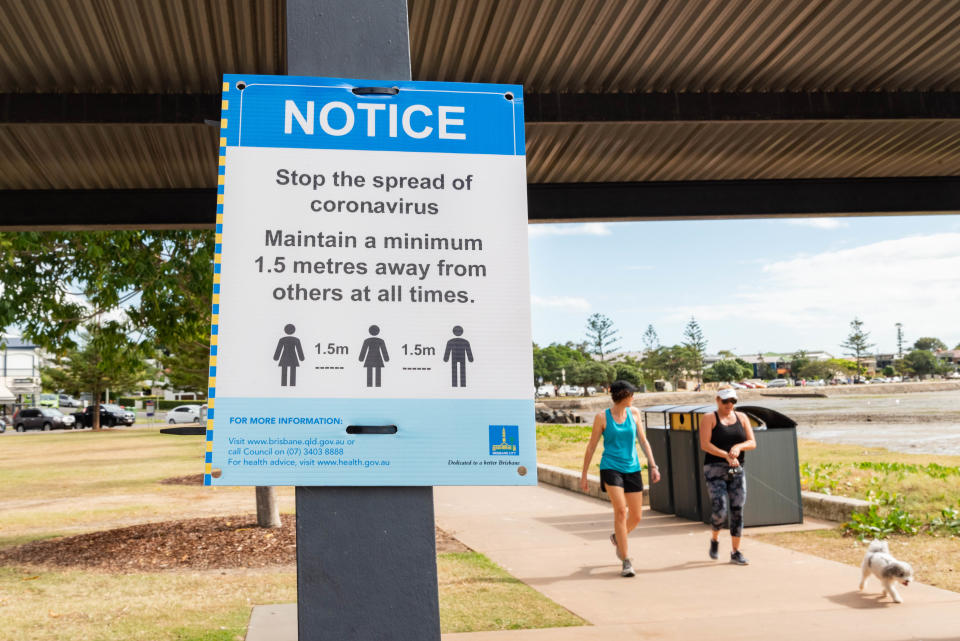Will this weekend be a turning point in coronavirus battle after restrictions ease?
Yahoo News Australia's Life After Lockdown series investigates what life will be like after coronavirus restrictions.
As the number of active coronavirus cases in Australia continues to dwindle, states across Australia have either lifted some restrictions or plan to do so in the coming days.
In NSW from Friday, two adults will be allowed to visit another household with their dependent children, Western Australia is already allowing gatherings of up to 10 people, and Queenslanders will be able to hop in their cars and enjoy recreational activities up to 50km from home this weekend.
However, with legitimate concerns of a “second wave” in Australia, some people are questioning if the relaxed restrictions are worth the risk.

Professor Peter Collignon, an infectious diseases physician and microbiologist who teaches at the Australian National University, isn’t too concerned with seeing a spike in cases following eased restrictions.
“I think it’s a good thing we’re relaxing some of the restrictions that have been put in place,” he told Yahoo News Australia.
“Because we know how this [the coronavirus] spreads.
“It spreads by droplets, in other words you cough or you sneeze and moisture-laden particles drop about one and a half metres away from you, and then we pick it up on our hands and we self-inoculate, or get it on to somebody else’s face.”
Given what we know about how the virus spreads, Prof Collignon says we know what we need to do to protect ourselves.
Continue to practise good hygiene, cover your mouth when you cough or sneeze, still maintain a safe distance of 1.5 metres and avoid crowds.
Chance numbers will increase, but not spike
NSW, the state with the most confirmed cases of coronavirus in Australia announced earlier this week two adults can visit another household and you can go out to a shop for non-essential items.
Prof Collignon did say if you are meeting with more people you are increasing the risk of getting infected and there is a chance there will be an increase in numbers when restrictions ease.
“If those people keep the numbers down [in social gatherings] and do all the right things, keep as much distance as you can most of the time, then yes, we might see some extra cases but it’s not going to be a real big spike, it’s going to be an increasing ripple and low numbers that we see,” he said.
Prof Collignon says you’re still better off mixing with just a few people when restrictions begin to ease.
“You don’t want two people go to everybody’s house ever half an hour,” he said.
“You still want to minimise the number of people you interact with, as much as is reasonable to do while keeping your sanity and livelihood.”
‘Being outside is safer’
He said at the end of the day, everyone just needs to be sensible going forward and suggests being outside is likely safer than being inside.
While there’s optimism surrounding coronavirus case numbers, the Bureau of Meteorology warns it’s “all downhill from here”, with low temperatures and rain over the southern parts of Australia for the remainder of this week.
Prof Collignon suggests sitting outside if possible and keeping a distance of 1.5 metres when you can will decrease the risk of infection.
In terms of what other rules Prof Collignon would like to see, he said he wants to see children under the age of 15 back in schools and more people enjoying the outdoors.
“If you’re going to have a picnic in the park for instance, just with your household members and you’re keeping two metres away from everybody else, it’s hard to see how you will either give or get this infection,” he says.

Fishing, enjoying the scenery or going for short drives with your household are all activities Prof Collignon deems to be “low risk”.
It goes without saying if you feel sick, whether you think it is COVID-19 or a sniffle, you should not be mingling.
"Don't take risks. We don't want to see the numbers suddenly spike up because people are being irresponsible," NSW Premier Gladys Berejkilian warned when she announced the state’s easing of social distancing measures earlier this week.
Coronavirus: What you can and can't do under this weekend's new visit rule
Why coronavirus death toll could be 60% higher than we think
Will eased restrictions draw out asymptomatic cases?
While some people experience severe symptoms of the coronavirus, some don’t experience any at all.
It was previously speculated nearly half of all patients diagnosed with COVID-19 don’t experience any symptoms.
With people moving about a little more freely again, Prof Collignon said there is a possibility more asymptomatic cases might be identified, however, he says the majority of transmission is through people who are showing symptoms.
“You know, coughing and spluttering or having some symptoms,” he says.
He points out the outbreaks which Australia has had in nursing homes or at weddings, the person or persons who have been responsible for infecting others have had symptoms and gone out to work.

“All the available evidence we have at the moment is the majority of spread is via people who have had symptoms, maybe mild symptoms, but they’ve had symptoms,” he says.
“Yes, asymptomatic people probably do spread this, but unless you’re coughing or spluttering it’s more difficult to spread the virus.”
Do you have a story tip? Email: newsroomau@yahoonews.com.
You can also follow us on Facebook, Instagram and Twitter and download the Yahoo News app from the App Store or Google Play.






